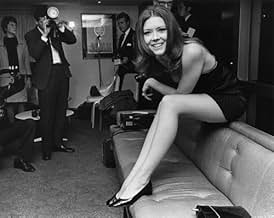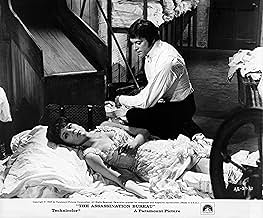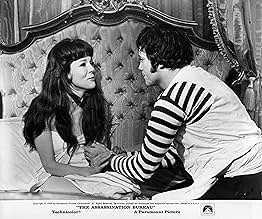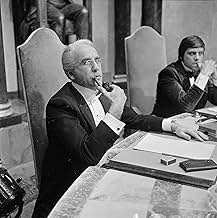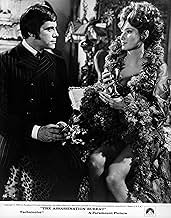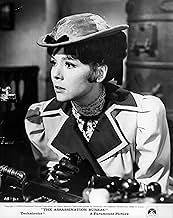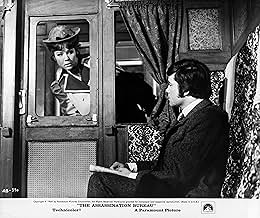Oliver Reed e Diana Rigg conducono un impeccabile cast nel film The Assassination Bureau, un "caper movie" pieno di spirito ispirato a un libro il cui co-autore è Jack London.Oliver Reed e Diana Rigg conducono un impeccabile cast nel film The Assassination Bureau, un "caper movie" pieno di spirito ispirato a un libro il cui co-autore è Jack London.Oliver Reed e Diana Rigg conducono un impeccabile cast nel film The Assassination Bureau, un "caper movie" pieno di spirito ispirato a un libro il cui co-autore è Jack London.
- Regia
- Sceneggiatura
- Star
- Premi
- 2 candidature totali
- Gen. von Pinck
- (as Curt Jurgens)
- Police Inspector
- (non citato nei titoli originali)
- French President
- (non citato nei titoli originali)
- French President
- (non citato nei titoli originali)
Recensioni in evidenza
A superb cast, headed by Oliver Reed and Diana Rigg, is underemployed.
Reed plays the chairman of the Assassination Bureau, Ltd. For a price, the bureau will undertake the homicide of deserving victims. Like a Star Chamber court they weigh each case by their own sense of justice.
Rigg, an enterprising journalist, decides to end the bureau by approaching Reed for a hit. Reed accepts, only to discover she wants Reed to assassinate himself. Amused, he accepts. The bureau, he thinks, has become too mercenary, killing whether they've carefully weighed the justice of the murder or not.
Bringing it before the Bureau, Reed suggests they clean house -- either they kill the chairman, or he kills all of them.
And this is just in the first fifteen minutes.
What follows is an episodic cat-and-mouse game and, like all episodic features, some episodes work better than others. The scenes in Switzerland and Vienna, for example, are remarkably uninteresting, while the scenes in Venice show flashes of brilliance. Best scene: Diana Rigg, swathed in only a towel, trying to discover whether there is a bomb in her room, whether it's just a clock, or whether it's altogether her imagination. The most embarrassing is an extended foray in a French bordello.
Scrumptuous turn-of-the-century sets, far better than anything in similar period features like "Chitty Chitty Bang Bang", make for great eye-candy. The whole feature plays light-handedly, so its treatment of death never comes off even as black-comedic, as with the superior "The Wrong Box". To accentuate the joking element is the addition of a wacky late-sixties type song about love that makes the Carpenters sound profound.
Silly as it is, and dull as it can be in spots, its high spirit is infectious. How much of it is Jack London, I don't know, but it's a far cry from "The Sea Wolf"
Actually he's sharper than that: THE CALL OF THE WILD and WHITE FANG were his attempts to tell a story from an animals' point of view. THE SEA WOLF is his attempt to attack the prevalent socio-economic doctrine of the day (1900): Social Darwinism, as practiced by Captain Wolf Larsen. He wrote one of the first good novels about America under a dictatorship: THE IRON HEEL. He discussed his early life in MARTIN EDEN. He discussed his alcoholism in his book JOHN BARLEYCORN. He was the first American novelist of real international stature to embrace socialism! A reporter as well as writer, his experiences watching the Japanese government prevent him from carrying out his job during the Russo - Japanese War turned him into a perpetually hostile critic of Japan's goals in the Pacific (although, to be fair to the Japanese, London did show some racism here).
Keeping this in mind, one realizes that THE ASSASSINATION BUREAU, LTD. has to be tackled differently from say THE CALL OF THE WILD or the short story TO BUILD A FIRE. London is looking with jaundice eye at the political system that had ruled Europe (and most of the world) since 1815 or so. It was oppressive and uneven, and even in the United States (probably the best major power to live in in terms of opportunity and social mobility) it was still badly flawed.
Assassination had become a serious tool for trying to influence European affairs from 1881 to 1910 (when the novel was begun by London). Tsar Alexander II of Russia was blown to bits in 1881 by a Nihilist group called "The People's Will". Although it was captured and most of its members hanged, others copied it. Assassinations continued in Russia up to 1911 including Interior Grand Duke Serge in 1904,Minister Von Phleve in 1905, and Prime Minister Peter Stolypin in 1911. Elsewhere the other states suffered. Presidents Garfield and McKinley were assassinated in 1881 and 1901 (the latter by a self-proclaimed anarchist). President Sadi Carnot of France was stabbed to death in a public parade in 1894, in the middle of a series of anarchist attacks (including a bombing at the Chambre of Deputies). Empress Elisabeth of Austria-Hungary, King Umberto I of Italy, the Prime Minister of Spain, King Carlos III of Portugal, were all killed. So were Lord Frederick Cavendish and Thomas Burke by Irish nationalists in Phoenix Park in 1882. Many smaller public figures were killed as well. The topic of an "assassination bureau" was timely - especially as some of these victims fit what the bureau decided: were the targets worthy of being assassinated.
Of course not all of them were (Empress Elisabeth for example). But London's vision was not totally flawed. It was just that being a realist he knew that the "pure" idea of the bureau would be corrupted sooner or later. So his plot involves the head of this international bureau being offered a huge reward if he orders his own assassination. Note that Oliver Reed's character is a Russian, as though the author knew who was most likely to be the head of an assassination group.
Probably due to other commitments London never finished the novel. Robert L. Fish, a successful mystery novelist, wrote a completion which was rather amusing. I tend to believe that was an error - London was seldom an amusing writer. The film treats the moral issue as a joke, and uses the characters as caricatures of the nations they represent (the doleful Russian, the gluttonous and sexually active Italian, the pragmatic Frenchmen who runs a bordello too, the English newspaper tycoon). These characters need good performers, and Philippe Noiret is on target as the bordello owner/assassin leader); and (although not Italian) Clive Revill is quite good as the Italian. The Russian (it's not Reed) is doleful, but hardly memorable. As for Lord Bostwick, Telly Savalas is not convincing as an English aristocrat (one can't even imagine him as a Canadian transplant to England, like Spencer Tracy in EDWARD, MY SON). Curt Jurgens' German assassination leader, General Von Pinck (the name suggested, perhaps, by his handiness with a sword) is either sadistically high-spirited or vicious: no other characteristics there.
Diana Rigg, as the budding journalist who's first job is actually as a cats-paw for Savalas (her boss) is pretty good, but her performance as Vincent Price's daughter in THEATRE OF BLOOD was livelier. She seems determined to maintain her suffragette style dignity here no matter what. However it happens to work for the film. As for Reed, his straight villains were usually far better than his heroes. He appears to be too laid back at times. A bit more jittery behavior would have been better.
One final point: One minor character, an Austrian nobleman marked for death, is killed when he cuts into a large knock-wurst (that has a bomb in it). This gag probably is not original but it was reused in the television movie MORE WILD WILD WEST with Jonathan Winters as the victim.
Lo sapevi?
- QuizJack London's original novel was left markedly incomplete at the time of his death, and it was not until many decades later that the thriller-writer Robert L. Fish (also known as Robert L. Pike) finished it for publication, amidst much publicity. The novel is noticeably more serious in tone than this movie, although a New York Times review at the time called it "delightfully ridiculous."
- BlooperIn the scene about 40-45 minutes in where Lord Bostwick visits General Van Pinck whilst the latter is at fencing practice, there's a map of Europe on the wall. Although this film ostensibly takes place before World War I, the map is of post-Versailles Europe, c.1925-1939.
- Citazioni
Miss Winter: With your ideas, I'm surprised you're shocked at the thought of war.
Ivan Dragomiloff: Not at all. It's purely a matter of business. How can we charge our sort of prices with everybody happily killing each other for a shilling a day?
I più visti
- How long is The Assassination Bureau?Powered by Alexa
Dettagli
- Data di uscita
- Paese di origine
- Lingue
- Celebre anche come
- El sindicato del crimen
- Luoghi delle riprese
- Cliveden House, Taplow, Buckinghamshire, Inghilterra, Regno Unito(Lord Bostwick riding in the woods towards Ruthenia)
- Azienda produttrice
- Vedi altri crediti dell’azienda su IMDbPro
- Tempo di esecuzione
- 1h 50min(110 min)
- Mix di suoni
- Proporzioni
- 1.85 : 1

